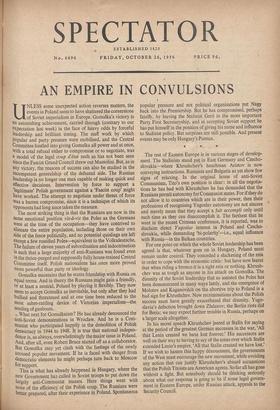AN EMPIRE IN CONVULSIONS
UNLESS some unexpected action reverses matters, the events in Poland seem to have shattered the cornerstone of Soviet imperialism in Europe. Gomulka's victory is an astonishing achievement, carried through (contrary to our expectation last week) in the face of heavy odds by forceful leadership and brilliant timing. The staff work by which Popular and party pressure were mobilised, and the Central Committee hustled into giving Gomulka all power and at once, with a total refusal either to compromise or to negotiate, was a model of the legal coup d'etat such as has not been seen since the Fascist Grand Council threw out Mussolini. But, as in any victory, the reasons of success can also be studied in the incompetent generalship of the defeated side. The Russian leadership is no longer one man capable of making quick and effective decisions. Intervention by force to support a legitimate' Polish government against a 'Fascist coup' might have worked. The attempt to negotiate under threat of force Was a barren compromise, since it is a technique of which its opponents had long since taken the measure.
The most striking thing is that the Russians are now in the same emotional position vis-a-vis the Poles as the Germans were at the time of the occupation—they have contrived to alienate the entire population, including those on their own side of the fence politically, and no potential quislings are left except a few russified Poles—equivalent to the Volksdeutsche. The failure of eleven years of subordination and indoctrination is such that a large majority of anti-Russians was found even in the thrice-purged and supposedly fully house-trained Central Committee itself. Polish nationalism has ,once more proved more powerful than party or ideology.
Gomulka maintains that he wants friendship with Russia on equal terms. And in theory the Russians might gain a friendly.
or at least a neutral, Poland by playing it flexibly. They now seem to accept Gomulka as inevitable, but only after they had bullied and threatened and at one time been reduced to the most sabre-rattling device of Victorian imperialism—the sending of gunboats.
• . What next for Gomulkaism? He has already denounced the anti-Soviet demonstrations in Wroclaw. And he is a Com- munist who participated happily in the demolition of Polish democracy in 1944 to 1948. It is true that national indepen- dence is, as always, overwhelmingly the major issue in Poland. And, after all, even Robert Bruce started off as a collaborator. But Gomulka may yet clash with the feelings of the newly aroused popular movement. If he is faced with danger from democratic elements he might perhaps turn back to Moscow for support.
This is what has already happened in Hungary, where the new Government has called in Soviet troops to put down the largely anti-Communist masses. Here things went with none of the efficiency of the Polish coup. The Russians were better prepared, after their experience in Poland. Spontaneous popular pressure and not political organisations put Nagy back into the Premiership. But he has compromised, perhaps fatally, by leaving the Stalinist Gera in the more important Party First Secretaryship, and in accepting Soviet support he has put himself in the position of giving his name and influence to Stalinist policy. But surprises are still possible. And present events may be only Hungary's Poznan.
The rest of Eastern Europe is in various stages of develop- ment. The Stalinists stand pat in East Germany and Czecho- slovakia—where Khrushchev's henchman Aristov is now conveying instructions. Rumania and Bulgaria as yet show few signs of relaxing. In the original home of anti-Soviet Communism, Tito's own position is clear : in all the negotia- tions he has had with Khrushchev he has demanded that the Russians permit autonomy for Communist states. For if they do not allow it to countries which are in their power, then their professions of recognising Yugoslav autonomy are not sincere and merely mean that they accept a fait accompli only until such time as they can disaccomplish it. The farthest that he went in the recent Crimean conference, it is reported, was to disclaim direct Yugoslav interest in Poland and Czecho- slovakia, while demanding 'bi-polarity'—i.e., equal influence with Russia—in the Balkan countries.
For one point on which the whole Soviet leadership has been agreed is that, whatever goes on in Hungary, Poland must remain under control. They conceded a slackening of the rein in order to cope with the economic crisis : but have now learnt that when riding a bronco it is a tight rein or nothing. Khrush- chev was as tough as anyone in his attack on Gomulka. The disunity of the Soviet leadership that so assisted the Poles has been demonstrated in many ways lately, and the emergence of Molotov and Kaganovitch on the abortive trip to Poland is a bad sign for Khrushchev. Now recriminations about the Polish success must have greatly exacerbated that disunity. Yugo- slavia's defection brought down Zlidanov; the Berlin riots did for Beria; we may expect further trouble in Russia, perhaps on a larger scale altogether.
In his secret speech Khrushchev jeered at Stalin for saying at the period of the greatest German successes in the war, 'All that Lenin created we have lost forever.' His successors are well on their way to having to say of the areas over which Stalin extended Lenin's empire, 'All that Stalin created we have lost.' If we wish to hasten this happy denouement, the governments of the West must encourage the new movement, while avoiding any action that can justify Khrushchev's absurd accusations that the Polish Titoists are American agents. So far all has gone without a fight. But somebody should be thinking seriously about what our response is going to be if some legal govern- ment in Eastern Europe, under Russian attack, appeals to the Security Council.










































 Previous page
Previous page